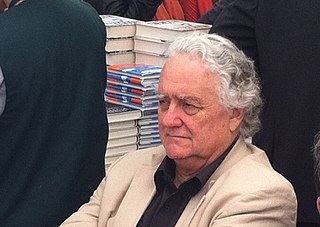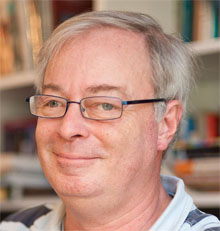
Konrad Zacharias Lorenz was an Austrian zoologist, ethologist, and ornithologist. He shared the 1973 Nobel Prize in Physiology or Medicine with Nikolaas Tinbergen and Karl von Frisch. He is often regarded as one of the founders of modern ethology, the study of animal behavior. He developed an approach that began with an earlier generation, including his teacher Oskar Heinroth.
Evolutionary epistemology refers to three distinct topics: (1) the biological evolution of cognitive mechanisms in animals and humans, (2) a theory that knowledge itself evolves by natural selection, and (3) the study of the historical discovery of new abstract entities such as abstract number or abstract value that necessarily precede the individual acquisition and usage of such abstractions. As a branch of inquiry in epistemology, evolutionary epistemology lies at the crossroads of philosophy and evolutionary biology.

Rupert Riedl was an Austrian zoologist.

Origination of Organismal Form: Beyond the Gene in Developmental and Evolutionary Biology is an anthology published in 2003 edited by Gerd B. Müller and Stuart A. Newman. The book is the outcome of the 4th Altenberg Workshop in Theoretical Biology on "Origins of Organismal Form: Beyond the Gene Paradigm", hosted in 1999 at the Konrad Lorenz Institute for Evolution and Cognition Research. It has been cited over 200 times and has a major influence on extended evolutionary synthesis research.

Dan Sperber is a French social and cognitive scientist and philosopher. His most influential work has been in the fields of cognitive anthropology, linguistic pragmatics, psychology of reasoning, and philosophy of the social sciences. He has developed: an approach to cultural evolution known as the epidemiology of representations or cultural attraction theory as part of a naturalistic reconceptualization of the social; relevance theory; the argumentative theory of reasoning. Sperber formerly Directeur de Recherche at the Centre National de la Recherche Scientifique is Professor in the Departments of Cognitive Science and of Philosophy at the Central European University in Budapest.

William C. Wimsatt is professor emeritus in the Department of Philosophy, the Committee on Conceptual and Historical Studies of Science, and the Committee on Evolutionary Biology at the University of Chicago. He is currently a Winton Professor of the Liberal Arts at the University of Minnesota and Residential Fellow of the Minnesota Center for Philosophy of Science. He specializes in the philosophy of biology, where his areas of interest include reductionism, heuristics, emergence, scientific modeling, heredity, and cultural evolution.

The Konrad Lorenz Institute for Evolution and Cognition Research (KLI) is an international center for advanced studies in the life and sustainability sciences. It is a "Home to Theory that Matters" that supports the articulation, analysis, and integration of theories in biology and the sustainability sciences, exploring their wider scientific, cultural, and social significance. The institute is located in Klosterneuburg, near Vienna, Austria. Until 2013, the institute was located in the family mansion of the Nobel Laureate Konrad Lorenz in Altenberg. Lorenz' work laid the foundation for an evolutionary approach to mind and cognition.

Biological Theory is a peer-reviewed scientific journal covering the fields of evolution and cognition, including cognitive psychology, epistemology, philosophy of science, philosophy of biology, evolutionary biology, and developmental biology. It was established in 2005 and originally published by MIT Press, sponsored by the Konrad Lorenz Institute for Evolution and Cognition Research (KLI). As of January 1, 2012, the publisher is Springer Science+Business Media. The first editor-in-chief was Werner Callebaut of the KLI and the University of Vienna). The current editor-in-chief is Stuart A. Newman of New York Medical College.

Gerd B. Müller is an Austrian biologist who is emeritus professor at the University of Vienna where he was the head of the Department of Theoretical Biology in the Center for Organismal Systems Biology. His research interests focus on vertebrate limb development, evolutionary novelties, evo-devo theory, and the Extended Evolutionary Synthesis. He is also concerned with the development of 3D based imaging tools in developmental biology.
The Vienna Series in Theoretical Biology is a book series published by MIT Press and devoted to advances in theoretical biology at large. By promoting the formulation and discussion of new theoretical concepts, the series intends to help fill the gaps in our understanding of some of the major open questions of biology, such as the origin and organization of organismal form, the relationship between development and evolution, and the biological bases of cognition and mind.
The Altenberg Workshops in Theoretical Biology are expert meetings focused on a key issue of biological theory, hosted by the Konrad Lorenz Institute for Evolution and Cognition Research (KLI) since 1996. The workshops are organized by leading experts in their field, who invite a group of international top level scientists as participants for a 3-day working meeting in the Lorenz Mansion at Altenberg near Vienna, Austria. By this procedure the KLI intends to generate new conceptual advances and research initiatives in the biosciences, which, due to their explicit interdisciplinary nature, are attractive to a wide variety of scientists from practically all fields of biology and the neighboring disciplines.

Werner Leinfellner was professor of philosophy at the University of Nebraska–Lincoln and at the Vienna University of Technology. After recovering from life-threatening wounds during World War II, he studied chemistry and physics at the Universities of Vienna and Graz, eventually turning to the study of the philosophy of science, and receiving his Ph.D. in 1959. He moved to the United States in 1967, in part, because of problems faced by empirically oriented philosophers in obtaining academic positions in Austria and Germany. He is notable for his contributions to philosophy of science, as a member of European Academy of Sciences and Arts, for founding the journal Theory and Decision, for co-founding Theory and Decision Library, and for co-founding the Austrian Ludwig Wittgenstein Society and International Wittgenstein Symposium.
Cognitive biology is an emerging science that regards natural cognition as a biological function. It is based on the theoretical assumption that every organism—whether a single cell or multicellular—is continually engaged in systematic acts of cognition coupled with intentional behaviors, i.e., a sensory-motor coupling. That is to say, if an organism can sense stimuli in its environment and respond accordingly, it is cognitive. Any explanation of how natural cognition may manifest in an organism is constrained by the biological conditions in which its genes survive from one generation to the next. And since by Darwinian theory the species of every organism is evolving from a common root, three further elements of cognitive biology are required: (i) the study of cognition in one species of organism is useful, through contrast and comparison, to the study of another species’ cognitive abilities; (ii) it is useful to proceed from organisms with simpler to those with more complex cognitive systems, and (iii) the greater the number and variety of species studied in this regard, the more we understand the nature of cognition.

Arturo Carsetti is an Italian Philosopher of sciences and former Professor of philosophy of science at the University of Bari and the University of Rome Tor Vergata. He is the editor of the Italian Journal for the philosophy of science La Nuova Critica founded in 1957 by Valerio Tonini. He is notable for his contributions, also as a member of the European Academy of Sciences and Arts, to philosophy of science, epistemology, metabiology, cognitive science, semantics and philosophy of mind.
Michael J. Owren was a Norwegian born American psychologist who contributed to the understanding of animal communication, the evolution of language, emotional communication, and vocal acoustics. His work focused on vocal phenomena in animals and humans. He pioneered digital spectral analysis techniques, first developed in speech science, for use in studies of animal communication. He studied primate vocalizations in terms of acoustics and communicative functions.
Konrad Talmont-Kamiński is an analytic philosopher and cognitive scientist, dealing with epistemology, philosophy of science, philosophy of mind and the theory of rationality. His work is also influenced by psychology, biology, history, anthropology and other disciplines.

Jorge Wagensberg Lubinski, was a Spanish professor, researcher and writer.
Karola Stotz was a German scholar of philosophy of biology, cognitive science, and philosophy of science. With Paul E. Griffiths, she pioneered the use of experimental philosophy methods in the field of philosophy of science.
Lee Altenberg is an American theoretical biologist. He is on the faculty of the Departments of Information and Computer Sciences and of Mathematics at the University of Hawaiʻi at Mānoa. He is best known for his work that helped establish the evolution of evolvability and modularity in the genotype–phenotype map as areas of investigation in evolutionary biology, for moving theoretical concepts between the fields of evolutionary biology and evolutionary computation, and for his mathematical unification and generalization of modifier gene models for the evolution of biological information transmission, putting under a single mathematical framework the evolution of mutation rates, recombination rates, sexual reproduction rates, and dispersal rates.
The International Society for the History, Philosophy, and Social Studies of Biology (ISHPSSB) is an international academic organization founded in 1989. THe society hosts the largest and most important meeting for the fields of philosophy of biology, history of biology, and the social studies/science studies/sociological studies of biology. The society hosts a biennial meeting, supports off-year workshops, runs a monthly newsletter, and offers various types of academic prizes.











